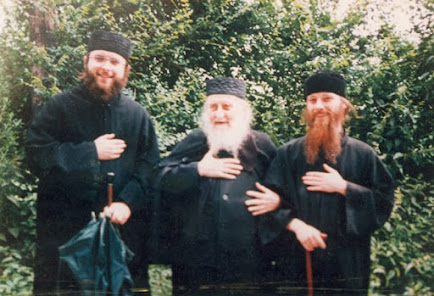 |
| Saint Sophrony with Father "Nikolai"(left) and "Seraphim". |
The
centrality of the theme in Fr Sophrony is partly determined by the amount of
attention the topic had recently been given by modern thinkers, not least by
Russian theologians and philosophers. The Russian philosophy of personhood
culminates in Berdyaev’s thought. In the theological milieu it was largely Florensky,
Bulgakov, and Lossky who brought the theme to the forefront of debate. Their
trinitarian perspective of personhood contributed significantly to a revival of
interest in trinitarian theology both in the east and in the west. In the
preceding years, as Kallistos Ware rightly observes (along with K. Rahner), the
relevance of trinitarian teaching in Christian theology was largely overlooked.
A
significant reestimation of the issue of personal identity in theology is also
due to the impact of research in psychology. Freud and Jung enhanced the
interest in the inner processes of self-awareness.
Fr
Sophrony’s personal experience allowed him to build up his own understanding of
the concept.
One
cannot easily discover a clear definition within the eastern patristic
tradition of hypostasis that would serve as a determinative background for Fr
Sophrony’s understanding of the concept of a person. Indeed, there is no
clearly definable consensus among the fathers. As Ware observes: “There is in
the Greek Fathers no single, systematic theory of personhood, or even agreed
terminology, but only a series of overlapping approaches.” Neither the dogmatic
legacy of the ecumenical councils nor the Palamite councils and synods offer
any sufficiently full definition of hypostasis. Concerning the church
teaching on the constitution of man, John Meyendorff observes: “There is no
dogma in physiology.”
In
Fr Sophrony also, though the hypostatic principle determines his theology to
the largest extent, there is, nevertheless, no full description of the
hypostatic principle and its meaning, not even in the chapter dedicated to that
theme. However, we may usefully examine some of Fr Sophrony’s allusions to his
understanding of person . He uses the Latin term persona as the equivalent and
synonym of the Greek patristic term hypostasis . In his writings he seems to
overlook the difference between the Greek term hypostasis and the Latin persona,
which is based on an important difference between objective and subjective
overtones.
He
admits how vast is the scope of interpretation of the term hypostasis, even in
scripture: “[it] conveys actuality . . . In many instances it was
used as synonym for essence . . . In the Second Epistle to the
Corinthians (2 Cor 11:17) hypostasis denotes sober reality and is translated
into English as confidence or assurance .” It also denotes the person of the
Father (Heb 1:3), substance (Heb 2:1) and very being (Heb 1:3). All these
various aspects stress, as Fr Sophrony observes “the cardinal importance of the
personal dimension in being.”
Besides
scripture, Fr Sophrony’s approach also reflects his traditional heritage. In
tradition hypostasis emerges out of the distinction between two different
aspects of being (the general and the particular): these were expressed in
Aristotelian terms as prote ousia (prime substance) and deutera ousia
(secondary substance). In the Cappadocians, who articulated the distinction
between hypostasis and essence in the Godhead, hypostasis corresponds to prote
ousia . Fr Sophrony expresses the classical patristic “dualism” in his own
vocabulary: “The hypostasis is a ‘pole,’ a ‘moment’ of the One and Simple
Being, where essence is another ‘moment.’” However, this dualism is
enriched and qualified by the Palamite conception of the divine being, which
elaborates a clear distinction between hypostasis , essence, and energies . Fr
Sophrony, however, prefers to focus on personeity in the Godhead and asserts
the hypostatic principle as the basis of divine being:
The
principle of the Persona in God is not an abstract conception but essential
reality possessing its own Nature and Energy of life. The Essence is not of
primary or even pre-eminent importance in defining the Persons-Hypostases in
their reciprocal relations. Divine Being contains nothing that could be
extraneous to the hypostatic principle.
Thus,
in the Trinity, hypostasis subsumes other aspects of being under its principle:
it determines divine being. The revelation i am that i am (I am Being) shows
that the hypostatic dimension in the Godhead has a prime significance. John
Zizioulas continues Fr Sophrony’s argument on the basis of cosmological
considerations. He rightly observes that creation was brought into being ex
nihilo by someone —a particular (personal) being—O on . The biblical revelation
does not focus on divine essence, placing primary stress on personeity in God,
while in other cosmogonies, be they “Phoenician” (where cosmogony is identical
with theogony) or “Greek” (with its dualism of Demiourgos -hyle ,
Creator-matter), “the particular [personal] is never the ontologically primary
cause of being.” Hence, Fr
Sophrony defines persona as “the one, who really lives.” It is a pivot, an axis
of all being: outside this living principle there can be nothing.
Fr
Sophrony, having established the prime significance of persona in being, does
not proceed to further definitions. As the principle, determinative to all
other aspects of being, persona is not subject to any determination nor, hence,
to any other definition. Even the human persona escapes definition, and remains
“hidden”: “In man, the image of the hypostatic God, the principle of persona is
the very ‘hidden man of the heart’ (1 Pet 3:4) . . . It is also
beyond definition.” Neither is it subject to any rational explanation:
“Scientific and philosophical cognition can be expressed in concepts and
definitions: but person is being, not subject to philosophical or scientific
forms of cognition. Like God, the persona -hypostasis cannot be throughly known
from outside unless he reveals himself to another person.”
Reference:
I LOVE
therefore I A M, The Theological Legacy of Archimandrite Sophrony .Nicholas V.
Sakharov.2002.
